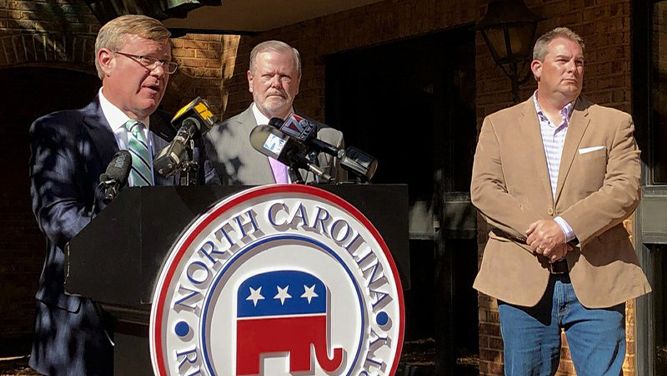RALEIGH, N.C. (AP) — North Carolina’s top elections administrator on Tuesday urged state lawmakers to move all of this year’s municipal elections to 2022 and bump back next year’s primaries from March to May due to delayed Census data.
Census numbers play a crucial role in how legislative districts are redrawn every decade. But even though the data was supposed to be delivered by next month, the federal government does not expect to have it ready to be released until September because of delays caused by the coronavirus pandemic.
North Carolina is now either the first state in the nation or among the first to put forward a plan that pushes local government contests to 2022.
Karen Brinson Bell, executive director of the North Carolina State Board of Elections, cited the Census setbacks as the driving force behind her recommendation to postpone the elections.
She noted that 62 of the more than 500 municipalities across the state need the Census data because candidates submit paperwork or voters cast ballots based on their specific ward or district. While it’s possible for many of the remaining local governments that do not require districts or wards to go forward without the Census data, Bell called on lawmakers to follow her advice in order to address redistricting and avoid confusing voters.
“It is very difficult for voters to understand why one municipality would be having an election, while another is not, especially when they’re accustomed to those elections being held at the same time,” Bell said.
She noted it’s unlikely redistricting would be completed in time for the December filing deadline ahead of the March 2022 primary. Every 10 years, states are tasked with creating new maps for state legislative and congressional races. Because of the delayed Census, Bell is asking leaders to endorse her 2022 recommendations for a May 3 primary, July 12 runoff primary and Nov. 8 general election. “We would propose that the municipal elections coincide with those election dates.”
The 2022 primaries include bids for U.S. Senate and House, judicial races and state legislative seats.
Wendy Underhill, director of elections and redistricting with the National Conference of State Legislatures, said she was not aware of any other places where Census delays could cause municipal elections to be delayed.
Underhill noted there’s a bill in Connecticut that would move municipal elections to November, but that is likely more of a reflection of a national trend of states adjusting their calendars for local races to boost voter turnout than a response to the delayed Census.
Michael Li, a senior counsel at the Brennan Center who focuses on redistricting, noted that a bill was filed in Texas earlier this month that would give the governor, lieutenant governor and state House speaker the ability to move the state’s 2022 primary if a redistricting plan is not in effect by Sept. 1. He believes the Census lag could become a catalyst for states like North Carolina to transition local elections to even-numbered years.
In North Carolina, the Republican-controlled General Assembly has the ultimate decision on when to hold the elections, and the state elections board is tasked with carrying out the plan.
Some state elections officials are concerned with the proposed overhaul to the voting timetable, particularly in places where updated Census data is not needed to carry out local contests.
“It causes me some heartburn to think about making a sweeping change that’s going to affect the election schedule proposal,” said Stacy Eggers, a Republican member on the state board of elections.
Scott Mooneyham, a spokesman for the North Carolina League of Municipalities, said Bell’s plan could actually lead to more confusion among longtime voters whose communities are unaffected by the Census but will experience later elections.
“I’m not suggesting the Board of Elections can do magic and fix this problem, but I’m not at all convinced that having a one-size-fits-all approach to this is the best approach,” Mooneyham said.
Damon Circosta, the Democratic chairman of the board, said he shares concerns about a lack of timely voting but added, “There’s really no good solution, and I trust the General Assembly will do what they need to do to give us the direction we need.”



